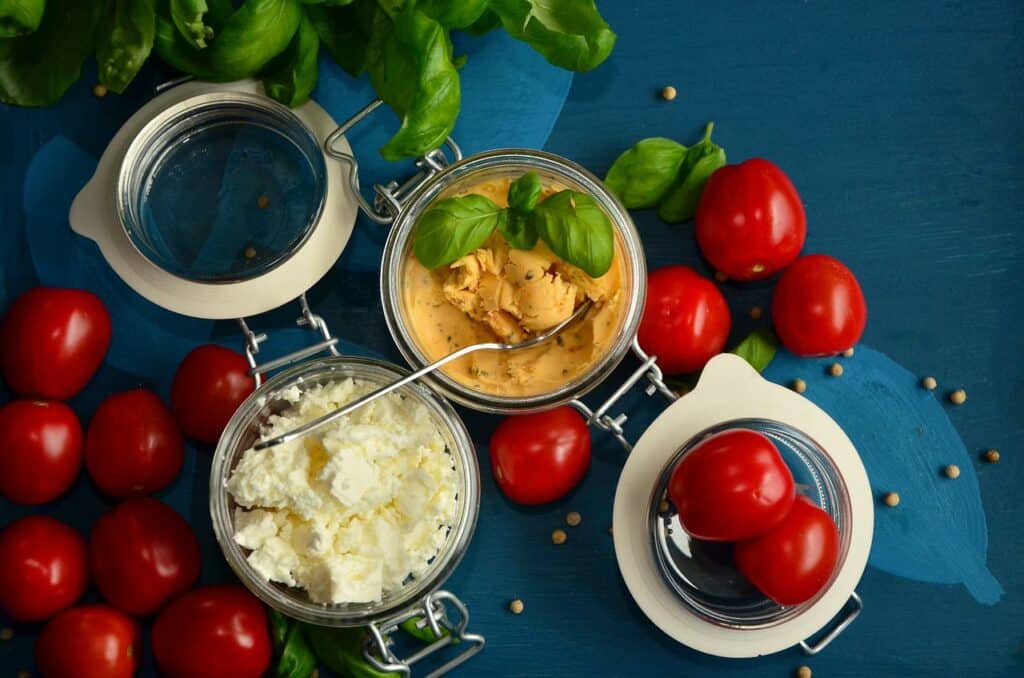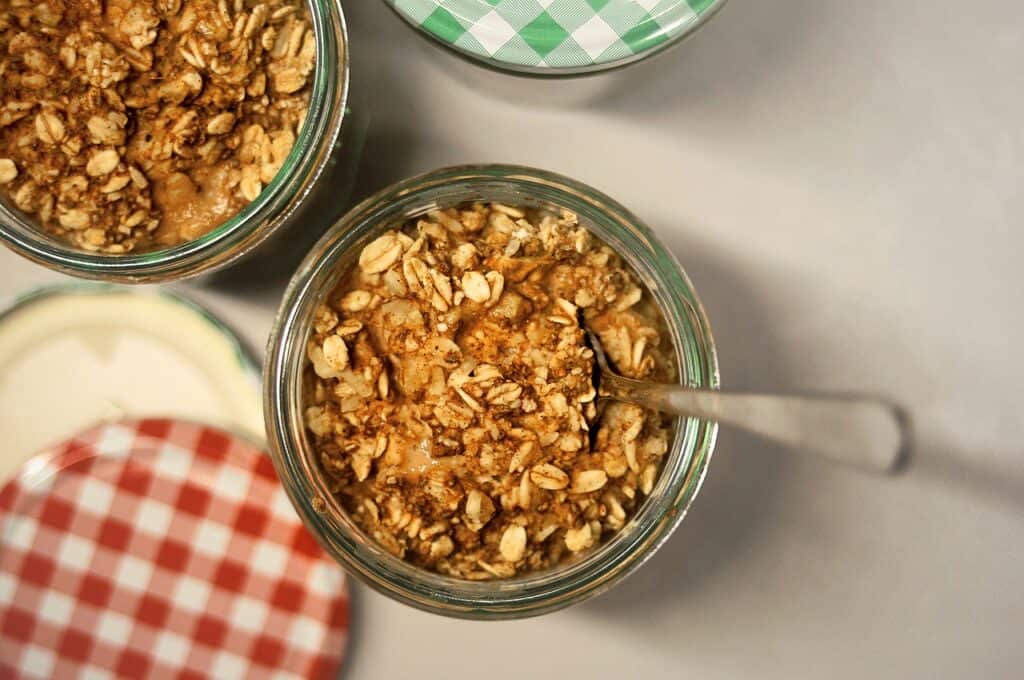When going zero waste or reducing carbon, buying in bulk, or buying during the right season means good planning. This also means finding creative ways to store food for the long term. We talk about glass jars here as a way to store foods by yourself.
Glass containers are a fantastic choice for the storage of food in any environment, including the pantry, the refrigerator, and even the freezer. Food freezing in glass jars is completely risk-free and quite simple to do, but there are a few things you should bear in mind before doing so.
We will discuss the benefits of using glass for food preservation in the freezer, the kinds of foods that can be frozen in glass containers, and some helpful hints for doing so.
Food Freezing In Glass Jars: Everything To Know

If you’re looking to extend the shelf life of your food, freezing is a great option. And while there are many ways to freeze food, using glass jars is a safe and effective method. Here’s everything you need to know about freezing food in glass jars.
There are a few things to keep in mind.
Freezing Does Not Kill Bacteria
First, freezing doesn’t kill bacteria, so it’s important to start with clean jars and clean food. Be sure to wash your jars thoroughly in hot soapy water, and rinse well. It’s also important to cook meat and poultry before freezing to kill any bacteria that may be present.
Water-Bath Method For High Acid Foods
When freezing high acid food in glass jars, you have the option of using the water bath method. This involves placing the still-open jars in a large pot or canner filled with boiling water. The boiling water should come up to the level of the lid on the jar. Once the jars are in the boiling water, let them sit for 10-15 minutes before removing them. There are things you shouldn’t use with the water bath method. Don’t do this with low-acid foods, meats, seafood, poultry, chili and beans, corn, and other low-acid vegetables.
Once your jars have been processed in the boiling water, they can be stored in the freezer for long-term storage. When you’re ready to use the frozen food, simply thaw it in the refrigerator or microwave. Be sure to use frozen food within a few months for optimal quality.
Leave Room In The Jar For Ice Expansion
Once your jars are clean and your food is prepped, it’s time to start freezing. Leave an inch of headroom in each jar for freezing expansion. If you don’t, then you’re setting up yourself for potential glass cracking and breaking. Then, seal the jars tightly and label them with the contents and date.
Related Reads: What thermostat temperature settings and heating degree days can teach you about your heating bills
Can You Put Glass Jars In The Freezer?
Glass jars can be safely stored in the freezer; however, there are a few considerations that need to be given before making this move. To get started, make it a point to leave about an inch of headroom at the top of each jar. This will ensure that there is enough space for the liquid to expand as it freezes, which is an important step in the process. Second, check to see that the jars are properly sealed and that they have labels indicating both the contents and the date.
In addition, as the last step, before you put the jars in the freezer, you need to treat them by employing a method that involves a water bath.
Advantages Of Food Freezing In Glass Jars
Better For The Health Of The Environment
- Glass, in contrast to plastic, is not produced using petrochemicals.
- Glass is a material that makes efficient use of resources because it is fabricated from abundant natural raw materials such as sand and scrap glass.
- However, tempered glass cannot be recycled and other types of glass, such as glass jars and bottles used for food packaging, can be recycled.
Better For The Health Of You And Your Family As A Whole.
- Glass does not include any hormone-disrupting chemicals like BPA, PVC, or phthalates in its composition.
- It will never transfer potentially dangerous substances into the food you eat.
Food Waste Decreases
- The use of glass helps reduce the amount of garbage produced by plastic containers and zip-lock bags.
- Instead of leaving leftovers in the refrigerator, you may freeze them instead.
- Leftover pieces of vegetables can be frozen and used to prepare soups and broth at a later time.
- Glass jars and containers make it less likely that food may ‘disappear’ in the gloomy freezer.
Easy To Maintain
- Glass doesn’t have pores, so it doesn’t take on odors or change color with time.
- Glass cannot be marred by scratches, so even after years of use, it will continue to appear pristine.
- It is simple to clean with soapy water, and it may even be put in the dishwasher.
- In contrast to plastic, it does not have pores, which allows it to dry up quite quickly.
Affordable
- Glass jars and containers of a high grade that are safe to store in freezers are inexpensive and versatile.
- Your glass jar collection can expand at a low cost if you keep the jars from things like pasta sauce, condiments, and pickles, among other things.
Versatile
- Jars and containers made of glass, including those sold under the brand name Glasslock Weck glass containers, are available in a wide variety of forms and dimensions.
- Certain containers, such as glass lunch containers, can go from the oven to the freezer (once the food has cooled) or from the freezer to the oven without any difficulty (once the food is thawed)
Foods That You Can Freeze In Glass Jar

Beans
After cooking dried beans, place them in a mason jar or other glass container, with or without liquid.
Biscuits
After baking and allowing the biscuits to cool, place them in a jar with a wide mouth and place them in the freezer.
Fruit And Vegetables
Freeze the fruit first by spreading it out in a single layer on a tray, and then transfer it to a glass jar or other container before placing it back in the freezer.
Citrus Zest
Save those zests from citrus fruits and cut down on food waste by freezing them in a jar or other container made of glass.
Vegetable Scraps
Vegetable peels and scraps can be frozen and used to make broth later.
Soup
When freezing soup, ensure that there is a gap of at least an inch or 3 centimeters between the glass jar or container and the broth (you could also use a stainless steel ice cube tray to freeze broth too).
Baby food
Create a large quantity all at once and freeze it in glass containers designed for baby food for easy and healthful meals every day.
Leftovers
Split leftovers into single-serving amount to make them easier to grab and go for lunch or dinner during the week.
Tips For Food Freezing In Glass Jars
When something is placed in the freezer, it is best practice to leave a space of at least three centimeters between the top of the jar and the rim of the freezer. This is because liquids expand when they get frozen. The glass jar container may break if you don’t leave a gap of at least three centimeters from the top.
Because not all glasses react the same way to thermal stress, heat, or freeze food and drinks in borosilicate or tempered glass containers. Old glass jars can be reused, however, they may break if frozen.
Because of the increased likelihood of cracking, we do not advocate the use of bottles with thin necks.
Good One: What is a low carbon food?
Benefits and Downsides Of Food Freezing In Glass Jars
When it comes to preserving food in glass jars through the process of freezing, there are positives and negatives involved with this method. Glass possesses several advantages, some of which include the following: it is less expensive than plastic, it does not take on the scent of odors that it comes into touch with, it is straightforward to clean, and it can be reused. But, on the other hand, is not only more likely to break, but it also does not insulate as effectively as plastic does when it comes to the issue of maintaining a consistent temperature.
Conclusion
Food freezing in glass jars is a great way to store food. However, you should be aware of the potential drawbacks, such as breakage and poor insulation. Glass is also less expensive than plastic, so it is a good option if you are on a budget. freezing in glass jars can also help you reduce food waste because you can store leftovers and scraps for later use.
